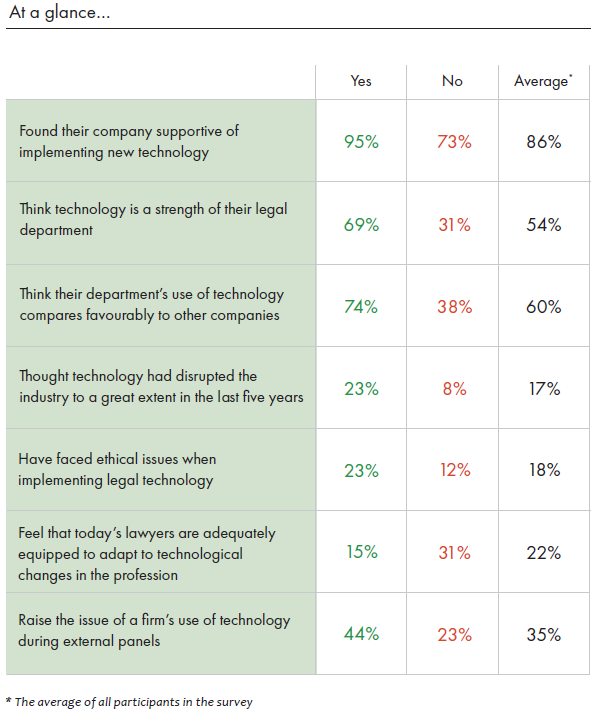Summary
Getting backing from the business is a crucial element for successfully implementing legal tech solutions, with a bigger budget as one of the strongest predictors of future behavior. Of the 62% respondents who had received an increased budget, 95% felt that their company was supportive of implementing new technology, compared to 73% who had not.
Making a first foray into legal tech can be a daunting experience for some legal departments. For a profession that (whether fairly or not) retains the reputation of being technological luddites, having the support of the wider organisation when taking the first steps with legal tech - or expanding on a positive start - can make all the difference, according to the in-house counsel that participated in our research.
A key element of any support received from the wider business was budget. It's one thing for an organisation to deliver empty platitudes about wanting to modernise its legal department, but putting its money where its mouth is can be an entirely different proposition altogether. Of the 140 in-house counsel across Latin America that were surveyed during the research for this report, 62% said that their department had received an increase in budget specifically for technology over the last five years.
Getting that increase in budget made a big difference too - both in the use of and attitudes towards legal technology. Of the 62% who had received an increased budget, 95% felt that their company was supportive of implementing new technology, compared to 73% who had not. Those who had received a budgetary boost were also much more likely to have a positive outlook on their department, with 69% saying that technology was a strength of their legal department and 74% saying that their department's use of technology compared favourably to other departments.
Compared to the 31% and 38% respectively for those that hadn't received an increase in budget, the difference in attitude was significant.
Perception of the impact technology was having on the legal profession differed significantly between those who had, and those who had not received an increase in budget too. Those who had received a boost to their budget tended to have a far more positive perspective on the impact technology had made on the legal profession in the past five years, with 23% believing it had disrupted the profession to a great extent, compared to 8% of those who hadn't received more budget. Equally, for those who had received an increased budget, only 33% said that technology had disrupted the profession to a small extent or not at all, compared to 54% who hadn't.
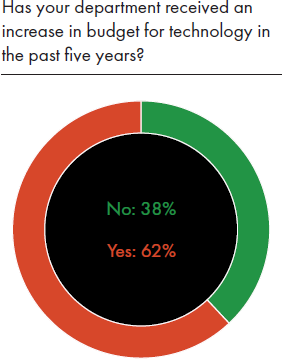
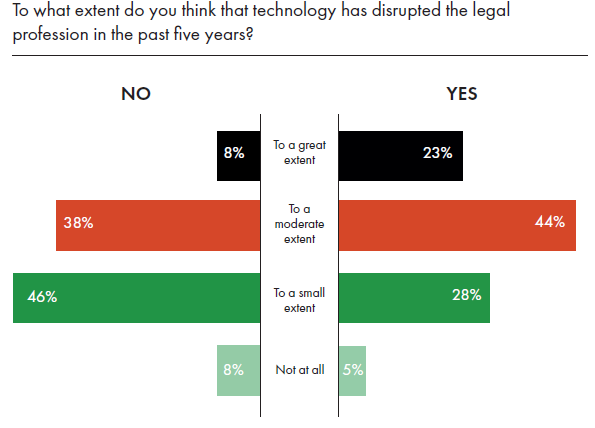
Interestingly, those who had received an increase in budget (and as a result, tended to have more experience with technology - particularly vanguard implementations) were much less likely to think that today's lawyers are adequately equipped to deal with changes to the profession caused by technology. Only 15% of those who had received a bigger budget thought that today's lawyers were sufficiently prepared, compared to 31% of those who hadn't received an increase in budget. Where budget didn't have an impact was how receptive today's lawyers were to the use of new technology - only two respondents from each group found that their legal team was not receptive to the use of new technology, despite a difference in opinion between the groups about how well prepared they are to actually utilise it.
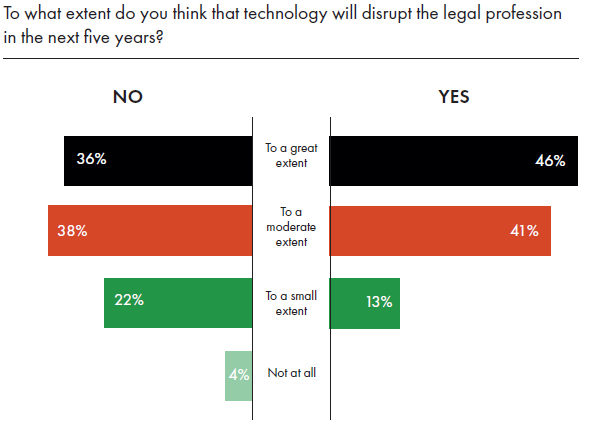
Ethical issues were one area where our research uncovered a significant divergence of opinions amongst general counsel. While most of our participants said that their use of technology had not raised ethical issues for their department, there was disagreement around whether these hadn't occurred for the bulk of our respondents, or whether they were not attuned to the new types of ethical issues that were inherent with a number of these technologies. For those who had received an increase in budget, they were nearly twice as likely as their counterparts who hadn't received an increase to report on ethical issues - 23% vs 12%. Based on the types of technologies that were being used by those with bigger budgets, it would be reasonable to infer that those who hadn't received an increase in their budget hadn't yet been exposed to a number of the ethical issues that were raised by those with bigger budgets.
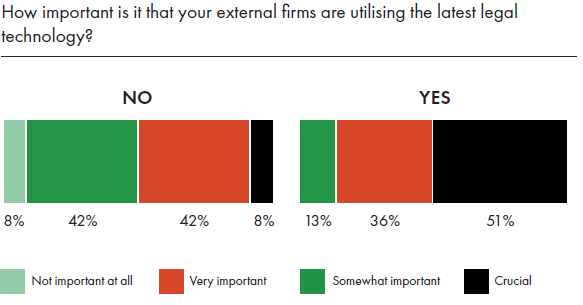
Our research also found that those who had received an increase in budget and were utilising more technology within their departments, were much more likely to take into consideration how their external firms were utilising similar solutions when assessing those relationships. For those who received an increase in budget, 51% said that it was crucial that their external firms were utilising the latest legal technology, compared to only 8% of those who hadn't received an increase in budget. Interestingly too, not a single general counsel whose department had received an increase in budget said that it was not an important factor. Compared to those who hadn't received an increase in budget, where 50% said it was not important or only somewhat important, it's evident that the attitudes and behaviours internally with regards to technology translated to markedly different approaches to handling relationships with external firms.
In addition, nearly half (44%) of those who had received an increase in budget raised the issue of a firm's use of technology during external panels, compared to 23% who didn't. Some of the general counsel we spoke with said this was a critical issue when making decisions around external firms, as they wanted to know that firm's were working at their optimal efficiency, but also considered whether their own internal systems would align or had the potential to be integrated with that used by their firms.
